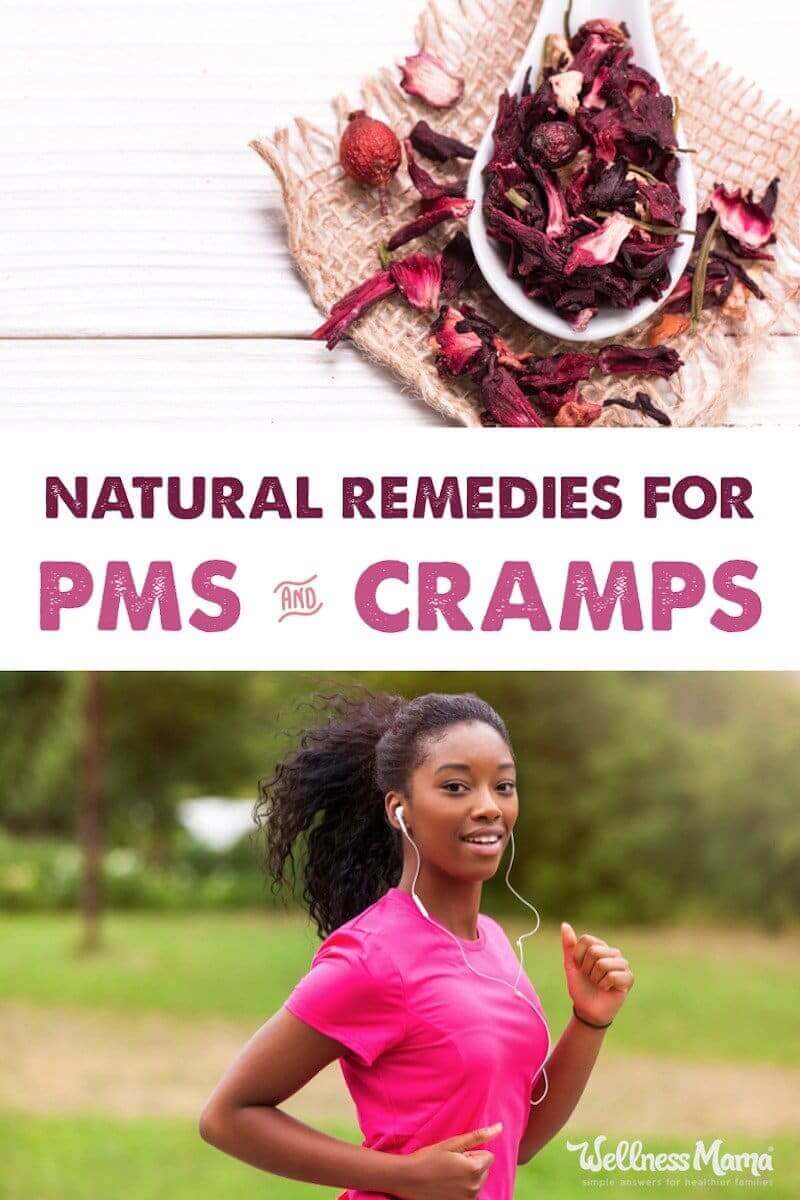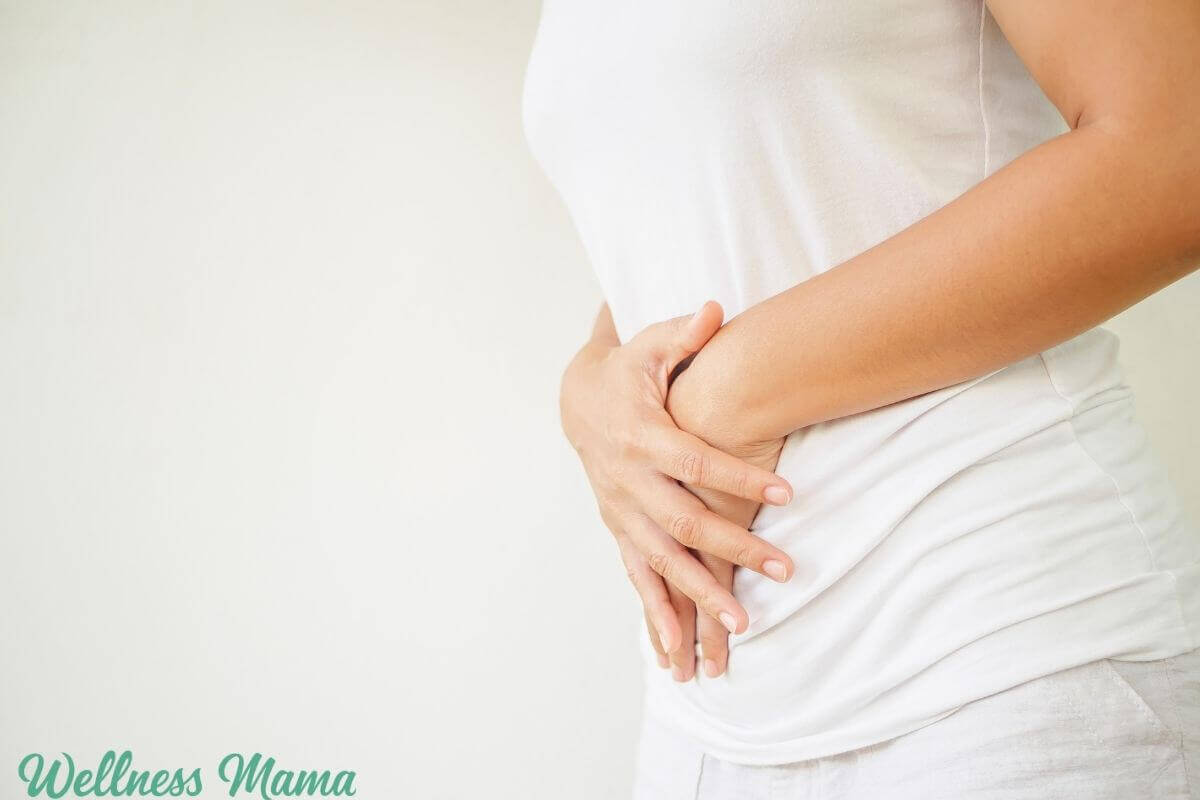I get more hormone and fertility related questions than any other topic, and my post on nine ways to balance hormones naturally has been my most visited post every single day for the last several months!
Hormones have a much bigger impact that many people realize, and women who struggle from hormone related pain and other symptoms realize this acutely. I’ve gotten an especially large influx of questions about PMS, PMDD and menstrual issues like cramps lately, and figured this was an important issue to address. I used to struggle with horrible PMS and cramps myself, and can certainly sympathize with how frustrating these things can be.
What Causes PMS and Menstrual Problems?
PMS, by definition, refers to a wide range of symptoms that start during the second half fo the cycle and which can include headache, dizziness, cramps, irritability, bloating, breast tenderness, nausea, vomiting, food cravings or aversions, weight gain, irritability, depression, anxiety and fatigue. These symptoms usually occur before menses begins and subside gradually at the onset of the period. Other menstrual symptoms like abdominal cramping and heavy bleeding can occur during menses.
While a variety of factors can influence a woman’s symptoms during this time (including genetics, nutrition, medications, etc), it is largely controlled by hormones, and getting hormones in proper balance can go a long way toward reducing symptoms. The monthly fluctuation of estrogen and progesterone (and other hormones like FSH and LH) largely controls a woman’s cycle and there are theories that these hormones can interact with certain brain chemicals, creating real symptoms during these times.
Optimally, these hormones are in balance and working correctly, and this interaction might cause little to no discomfort or symptoms, but if these hormones are out of balance, a variety of symptoms can occur.
In my own life and in working with others, I have seen how dietary and supplement changes can greatly impact the estrogen/progesterone balance and alleviate many of these symptoms. The effectiveness of each of these individual methods will vary by individual, but a comprehensive plan can often greatly alleviate symptoms across the board.
Nutrition Changes
1. Avoid Polyunsaturated Omega-6 fats in Large Amounts
“I’ve talked about this before, but the body is simply not meant to consume these man-made fats found in vegetable oils. From that article:
About 97% of the fat in the human body is saturated and monounsaturated fat, with only 3 % Polyunsaturated fats. Half of that three percent is Omega-3 fats, (the other half is Omega-6 fats) and that balance needs to be there. Vegetable oils contain very high levels of polyunsaturated fats, and these oils have replaced many of the saturated fats in our diets since the 1950s.
The body needs fats for rebuilding cells and hormone production, but it has to use the building blocks we give it. When we give it a high concentration of polyunsaturated fats instead of the ratios it needs, it has no choice but to incorporate these fats into our cells during cell repair and creation.
The problem is that polyunsaturated fats are highly unstable and oxidize easily in the body (if they haven’t already oxidized during processing or by light exposure while sitting on the grocery store shelf). These oxidized fats cause inflammation and mutation in cells.
In arterial cells, these mutations cause inflammation that can clog arteries. When these fats are incorporated into skin cells, their mutation causes skin cancer. (This is why people often get the most dangerous forms of skin cancer in places where they are never exposed to the sun, but that is a topic for another day!)
When these oils are incorporated into cells in reproductive tissue, some evidence suggests that this can spur problems like endometriosis and PCOS. In short, the body is made up of saturated and monounsaturated fats, and it needs these for optimal health.”
Bottom line: Don’t eat fats like Vegetable oil, peanut oil, canola oil, soybean oil, margarine, shortening or other chemically altered fats. Choose fats like coconut oil, real butter, olive oil and animal fats (tallow, lard) from healthy sources instead and eat lots of high Omega-3 fish.”
2. Avoid Chemicals in Food and Household
“Toxins found in processed foods, pesticides, plastics, household chemicals and even mattresses can contain hormone disrupting chemicals that mimic hormones in the body and keep the body from producing real hormones. Things like hormonal birth control can (obviously) do the same thing.
If you have hormone imbalance or are struggling to get pregnant, avoiding these toxins is very important! Cook in glass or non-coated metal pans (no non-stick or teflon!) and avoid heating or storing foods in plastic. Find organic produce and meat whenever possible and don’t use chemical pesticides or cleaners. There are recipes for natural cleaners on this page.”
3. Eat enough of the right kinds of fats:
Eating fats like quality organic meats, butter, tallow, coconut oil, ghee, olive oil, etc can help boost proper hormone production. While the wrong kinds of fats (see above) can interfere with hormone production, eating enough of the proper fats can really help!
“Coconut Oil is amazing for hormone health. It provides the necessary building blocks for hormone production, can assist weight loss, reduce inflammation, and even has antimicrobial and antibacterial properties.
If you really need hormone help, aim to consume 1/4 cup of added coconut oil a day. My favorite way is to blend into coffee or tea. This is the highest quality one I’ve found.
4. Avoid Inflammatory Foods
Foods like grains, dairy and vegetable oils can create inflammation in the body and can exacerbate hormonal problems. The degree that these foods will affect the body varies by person, but I have seen several cases where severe hormonal symptoms were resolved by just adopting a grain free and dairy free diet.
Especially for the first few months, focusing on foods like homemade bone broths, soups, grass fed meats, and healthy fats (butter, coconut oil, tallow, ghee, etc) will help the body rebuild and reduce inflammation. Check out the recipe index for some simple meal ideas.
Helpful Supplements for PMS
“In a perfect world, we would be rising and sleeping with the sun, getting Vitamin D from the sun and Magnesium from the ocean while relaxing and exercising in great balance each day in a stress-free world. Since I doubt that describes any of us currently, supplements can fill in the gaps. I’ve talked about the basic supplements that I take before, but there are some specific ones that are helpful for hormone support.
- Maca– A tuber in the radish family that has a history of boosting hormone production and libido. Many women notice less PMS, increased fertility, and improved skin while men notice increased sperm production, libido and better sleep. Maca is also high in minerals and essential fatty acids, making it great for hormones. It is available in powder form you can add into a drink (least expensive option). Maca should be discontinued during pregnancy. The effects of Maca are somewhat cumulative, so the best results are seen after 3-5 weeks of taking Maca regularly.
- Magnesium– Magnesium supports hundreds of reactions in the body and often contributes to better sleep (which is great for hormones!). There are several effective forms of Magnesium: In powder form with a product like Natural Calm so that you can vary your dose and work up slowly, ionic liquid form can be added to food and drinks and dose can be worked up slowly,or transdermal form by using Magnesium oil applied to skin. This is often the most effective option for those with damaged digestive tract or severe deficiency. Magnesium often greatly helps both PMS symptoms and menstrual cramping.
- Vitamin D– A pre-hormone is supportive of hormone function. Best obtained from the sun if possible, or from a D3 supplement or Fermented Cod Liver Oil (what I do in the winter). Make sure not to get too much, and optimally, get Serum Vitamin D levels checked to monitor levels.
- Fermented Cod Liver Oil– Provides many of the necessary building blocks for hormone production including Vitamins A, D, and K. It also is a great source of Omega-3s and beneficial fats.
- Gelatin is a great source of calcium, magnesium and phosphate. It supports hormone production and digestive health and helps sooth inflammation, especially in joints.
- Vitex/Chaste Tree Berry– Nourishes the pituitary gland and helps lengthen the luteal phase. It lowers prolactin and raises progesterone. For some women, this alone will improve symptoms.
- Natural Progesterone Cream– PMS and menstrual troubles are often linked to specific hormone imbalances. Especially for those with short cycles or short second phase of their cycle (ovulation through start of menses), progesterone can be the issue. I’ve seen people add only natural progesterone cream and see symptoms greatly reduce. If you do use progesterone cream, do you own research, make sure you have a good brand that is soy-free and only use for the second half of your cycle (ovulation through menses).
- Red Raspberry Leaf– A well know fertility herb that is also helpful in reducing PMS and cramping. It has a high nutrient profile and is especially high in calcium and is a uterine tonic. It is available in capsule form, but makes an excellent hot or cold tea.
NOTE: Make sure to check with your doctor or health care professional before taking any new supplements, especially if you are on medications or contraceptives.
Lifestyle Factors
1.Sleep
I Can’t emphasize this one enough! If you aren’t getting enough sleep, your hormones will not be balanced. Period.
Use these tips to help improve your sleep and just do it! This can singlehandedly improve hormones and is even linked to longer life, less chance of disease and optimizing weight.
2. Natural Menstrual Options
I’ve written about it in detail before, but switching to natural feminine hygiene options like cloth pads or the Diva Cup may really help reduce cramping in some women. Some women do not react well to the chemicals in tampons and pads and these natural options provide a chemical free solution. There is also no risk of Toxic shock syndrome with these options.
3. Exercise
If you have hormone imbalance, intense extended exercise can actually make the problem worse in the short term. Sleep is actually more important, at least during the balancing phase, so focus on relaxing exercises like walking or swimming and avoid the extended running, cardio and exercise videos, for now….
Due to its blood sugar balancing and lymph stimulating effects, the T-Tapp system is helpful for some women and is a low-impact exercise that can be very effective.
Have you ever struggled with hormone related symptoms? Were there any things that helped you? Share below!



Leave a Reply